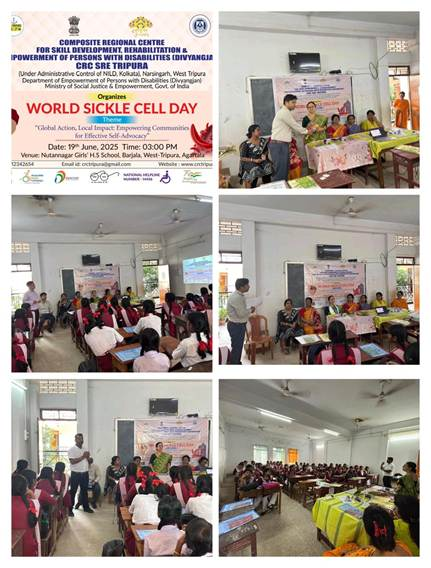DEPwD Leads Nationwide Campaign on World Sickle Cell Awareness Day 2025
The initiative focused on early diagnosis, access to care, and community-based empowerment, aligning with the government’s mission to reach underserved populations.

- Country:
- India
In a countrywide observance of World Sickle Cell Awareness Day 2025, the Department of Empowerment of Persons with Disabilities (DEPwD), under the Ministry of Social Justice and Empowerment, launched an extensive awareness drive through its National Institutes and Composite Regional Centres (CRCs). Held annually on 19th June, the day aims to foster greater understanding of Sickle Cell Disease (SCD)—a life-long genetic disorder that particularly affects tribal and marginalized populations.
This year’s global theme, “Global Action, Local Impact: Empowering Communities for Effective Self-Advocacy,” resonated through a series of impactful lectures, seminars, outreach programmes, and webinars across India. The initiative focused on early diagnosis, access to care, and community-based empowerment, aligning with the government’s mission to reach underserved populations.
Understanding Sickle Cell Disease: A Public Health Priority
Sickle Cell Disease is a chronic hereditary blood disorder characterized by abnormally shaped red blood cells that obstruct blood flow, leading to severe pain, infections, fatigue, and even organ damage. It is most prevalent in India among tribal communities in states like Madhya Pradesh, Chhattisgarh, Maharashtra, Odisha, Jharkhand, and Gujarat.
Recognized globally by the United Nations, World Sickle Cell Day serves as a reminder of the urgent need to address disparities in healthcare and bolster public health infrastructure. In India, where millions live with the condition, early intervention and societal awareness can make a profound difference in quality of life and life expectancy.
Nationwide Activities by DEPwD Institutions and CRCs
In line with its mandate to empower persons with disabilities and vulnerable groups, DEPwD’s institutions carried out a variety of localized programmes aimed at enhancing disease literacy and fostering community engagement:
-
National Institute for Locomotor Disabilities (NILD), Kolkata Hosted an awareness programme at NRS Medical College, bringing together patients, caregivers, and healthcare professionals. Discussions covered the medical aspects of SCD, including latest diagnostic protocols and treatment advancements.
-
National Institute for Empowerment of Persons with Multiple Disabilities (NIEPMD), Chennai Held a public outreach event at Chengalpattu, emphasizing community support, nutritional strategies, and holistic disease management. Participants included local residents, healthcare workers, and self-help groups.
-
Swami Vivekanand National Institute of Rehabilitation Training and Research (SVNIRTAR), Cuttack Organized sessions on early detection, highlighting the need for prenatal screening, genetic counseling, and school-based interventions. Testimonials from affected individuals underscored the social challenges they face.
-
National Institute for the Empowerment of Persons with Intellectual Disabilities (NIEPID), Secunderabad Conducted a seminar for parents, students, and professionals working in disability care. The session focused on overlapping cognitive challenges in children with SCD and the importance of integrated care.
-
Composite Regional Centre (CRC), Tripura Held an awareness campaign at Nutan Nagar Girls Higher Secondary School in Agartala. The event featured interactive sessions with students and teachers to dismantle stigma and promote early reporting of symptoms.
-
CRC Gorakhpur Through its Cross-Disability Early Intervention Centre (CDEIC), CRC Gorakhpur ran a targeted seminar for children and their caregivers. Experts spoke about the disease’s impact on child development and urged timely medical attention.
-
CRC Nagpur Conducted an online webinar accessible to rural audiences, making use of digital platforms to extend awareness. Specialists addressed frequently asked questions and shared practical strategies for managing chronic symptoms.
In addition to these flagship events, numerous other National Institutes and CRCs across India hosted region-specific activities, contributing to a synchronized national effort to combat misinformation and improve patient outcomes.
Driving Community Advocacy and Healthcare Accessibility
One of the core objectives of this year’s campaign was to promote community-driven solutions. By empowering local populations with knowledge and tools for self-advocacy, DEPwD hopes to catalyze early diagnosis, improved treatment adherence, and reduced mortality.
Efforts also dovetailed with the government’s broader initiatives such as the National Sickle Cell Anemia Elimination Mission, which aims to screen 70 million individuals by 2030, primarily focusing on tribal and high-risk regions.
Looking Ahead: From Awareness to Action
The 2025 observance marked a significant milestone in India's evolving public health strategy against SCD. It reinforced that tackling such a pervasive disease requires multi-stakeholder collaboration, spanning public health systems, educational institutions, civil society, and empowered individuals.
With a comprehensive awareness campaign spanning metros and remote villages alike, DEPwD's initiatives this year serve as a blueprint for future community-centric healthcare models. The Department remains committed to building inclusive systems that ensure timely care, social acceptance, and a life of dignity for those affected by Sickle Cell Disease.










